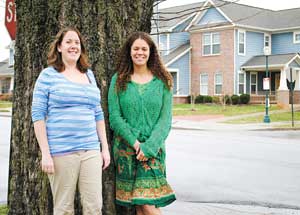Editorial
Front Page - Friday, March 19, 2010
Local Sierra Club gets serious about environmental issues
Erica Tuggle
 Elizabeth Tallman and Jamie Brown of the Sierra Club stand outside the Bethlehem Community Center, where the local Cherokee branch office of the club is located. Before Jamie started planning for the local chapter to regroup four years ago, the group had been inactive for three to five years.
- Erica Tuggle
Elizabeth Tallman and Jamie Brown of the Sierra Club stand outside the Bethlehem Community Center, where the local Cherokee branch office of the club is located. Before Jamie started planning for the local chapter to regroup four years ago, the group had been inactive for three to five years.
- Erica Tuggle
If the mountaintop in your town was blasted off, you may start paying attention to your energy consumption, Jamie Brown, the vice chair for the local Cherokee branch of the Sierra Club, says. But, by then, it may be too late, she adds.
Mountaintop removal, which involves the clear cutting of land and the removal of a mountaintop to retrieve the coal inside, is just one of many local and national environmental issues the Sierra Club works to spread awareness and action about.
“If people would conserve in little ways, there wouldn’t be the need for another mountaintop removal,” Brown says. “TVA, the largest purchaser of mountaintop removal coal, work on a supply and demand basis and will give the energy from the coal to us if we are constantly overusing it.”
The larger problem with the overuse of energy is that everything in the environment is connected, Elizabeth Tallman, the Cherokee Group organizer and group chair, says.
Excess energy usage causes more mountaintop removal, which violates the Clean Water Act. This means the energy used in Chattanooga is directly affecting the water quality for all of Appalachia, Tallman says. From there, water quality issues effect wildlife preservation and health issues by contaminating food products, and it is soon evident that the ripple of the first effect on the environment is felt on other aspects of life throughout the world, she says.
The Sierra Club is the oldest and most influential grassroots environmental organization in the nation, with 1.3 million members and growing. While the national club is focusing on the topics of protecting arctic wildlife refuge, global warming and recycling, the local branch, of about 1,000 members, is honing in on timely issues affecting the region, Tallman says.
Right now, the group has several focuses they want to provide education and support for in the community, she says. Storm water fees, which increase dramatically as untreated, raw sewage is dumped into the Tennessee River; Corridor K, a new interstate highway being build through the Cherokee forest; protection of 20,000 acres of Eastern Tennessee; and work on the Bottle Bill, which would allow the state to collect money for bottles to encourage the growth of recycling are just a few of the larger projects the Cherokee branch is currently working on, Tallman says.
The last Monday of the month, the Cherokee branch of the Sierra Club meets at Green Spaces on 63 E. Main St. at 7 p.m. She says it is there that they discuss the progress of the club over the past month on the issues, areas not being addressed and events.
Like the national branch, the Cherokee group offers outings for its members twice a month. Tallman says these include local hiking trips and overnight camping trips like the one they are planning in April to an uncut forest called Virgin Falls.
“It’s a good time to learn, get out and get some recreation. We believe it is really healthy to get out and breathe the clean air,” she says.
The local branch of the Sierra Club had been inactive for three to five years before sporadic work began four years ago on bringing the club back to the area, Brown says. This year will be the one-year anniversary of the club’s reactivity.
Brown says trying to tackle environmental issues at the global level almost always end in feelings of being overwhelmed, and nothing gets done.
“Staying at a local level and doing the little things result in one person, one group, making a difference,” she says. “By starting where you live, everyone gets involved, and it becomes a global effect.”
The local Sierra Club partnered with Leadership Chatta-nooga last year on recycling at Riverbend to aid with the mountainous sea of trash produced by the event, and, Tallman says, they plan to help out again this year. The club can also be spotted at the upcoming Chatta-nooga Green Festival on April 10, and are in the process of planning a bluegrass music festival and pancake breakfast, Brown says.
The Cherokee branch members are also working on building a Slow Food movement at UTC with the placement of a community garden and greenhouses on campus.
Brown says there should be more options for college students on a budget besides ramen noodles, macaroni and cheese and what the cafeteria serves.
She says, “It is especially important for young children to grow up knowing where their food comes from, and not to grow up with the misconception that their frozen burger patty just magically appeared out of the sky.”
Tallman says the best way to be informed on all the happenings of the Cherokee group is to sign up for the newsletter at http://tennessee. sierraclub.org/cherokee/.
“We have plenty of work
for anyone who wants to help,”
she says.
|
|